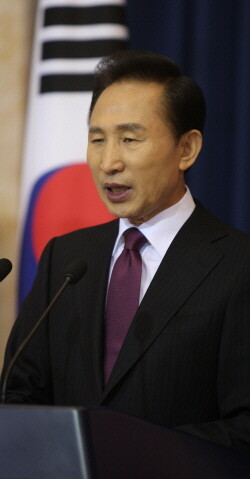hankyoreh
Links to other country sites 다른 나라 사이트 링크
President Lee’s New Year’s speech promises change in inter-Korean relations

During his New Year’s address on Monday, President Lee Myung-bak said, “We should make a new turning point in inter-Korean relations in 2010.” He also urged North Korea to return swiftly to the six-party talks.
President Lee said that he expected North Korea’s return to the talks would result in “advancement in the denuclearization of the Korean Peninsula and an opening of the floodgates of real South-North cooperation.”
President Lee added, “In order to accomplish this, a permanent body for dialogue between South Korea and North Korea first needs to be set in place.” He also said he intended to engage in dialogue with North Korea about the excavation of the remains of South Korean soldiers currently buried in North Korea.
Since the President’s remarks come on the heels of a North Korean New Year’s joint editorial issued on Friday indicating the country’s intention of improving inter-Korean relations, observers are focusing on whether 2010 will bring headway in South-North relations in the form of a possible summit meeting.
Observers say what is most noteworthy about President Lee’s New Year’s address is his reference to a “permanent body for dialogue.” While President Lee said he had in mind something like “the permanent senior-level liaison offices in Seoul and Pyongyang” that he had proposed in an April 2008 interview with the Washington Post, observers are noting the differences between the political situations on the Korean Peninsula then and now.
First, analysts say this permanent body for dialogue smacks strongly of consideration about recently suggested possibilities for improvements in North Korea’s relations with the U.S. and Japan. Speculation that the U.S. government suggested the installation of a “liaison office” to North Korea is rife among diplomats, and North Korea is known to have had a meeting in Nov. 2009 with the ruling Democratic Party of Japan.
Given the current trends in the peninsula’s political situation, the idea of a liaison office is somewhat more feasible now than it was two years ago when it was suggested as part of a political offensive in response to North Korea’s hard line against South Korea.
However, it is unknown how North Korea will respond. Liaison offices are generally installed as a relatively permanent dialogue channel prior to the formal establishment of diplomatic relations between countries, but for North Korea, which is still reluctant to pursue openness, the suggestion may be difficult to accept. Indeed, the country has repeatedly rejected proposals from South Korea for the installation of a liaison office, and has referred to the relationship between South Korea and North Korea as “a special relationship that is internal to a people rather than a formal relationship between countries.”
Given that North Korea has just made clear its intention to improve inter-Korean relations in its New Year’s joint editorial, some analysts are cautiously suggesting that a compromise may now be possible. Jang Yong-seok, research director at the Institute for Peace Affairs, says, “Things like a liaison office are issues of a dialogue framework rather than content, so some adjustments in the title or character could be possible.” A government official speaking on the condition of anonymity also left room for a possible compromise. The official clarified, “The issue at hand is not merely about the possibility of a liaison office, but rather the creation of a structure for dialogue.”
The excavation of the remains of South Korean soldiers was agreed upon at talks between South Korean and North Korean defense ministers in Nov.2007 following the October 4 declaration agreed upon earlier that year. Analysts say North Korea is likely to respond favorably as it represents a continuation of the October 4 declaration and presents a lesser burden than issues that involve “living citizens” such as POWs and abductees, and carries the possibility of compensation from South Korea for excavation expenses and other factors.
Please direct questions or comments to [englishhani@hani.co.kr]
Editorial・opinion
![[Column] Park Geun-hye déjà vu in Yoon Suk-yeol [Column] Park Geun-hye déjà vu in Yoon Suk-yeol](https://flexible.img.hani.co.kr/flexible/normal/500/300/imgdb/original/2024/0424/651713945113788.jpg) [Column] Park Geun-hye déjà vu in Yoon Suk-yeol
[Column] Park Geun-hye déjà vu in Yoon Suk-yeol![[Editorial] New weight of N. Korea’s nuclear threats makes dialogue all the more urgent [Editorial] New weight of N. Korea’s nuclear threats makes dialogue all the more urgent](https://flexible.img.hani.co.kr/flexible/normal/500/300/imgdb/original/2024/0424/7317139454662664.jpg) [Editorial] New weight of N. Korea’s nuclear threats makes dialogue all the more urgent
[Editorial] New weight of N. Korea’s nuclear threats makes dialogue all the more urgent- [Guest essay] The real reason Korea’s new right wants to dub Rhee a founding father
- [Column] ‘Choson’: Is it time we start referring to N. Korea in its own terms?
- [Editorial] Japan’s rewriting of history with Korea has gone too far
- [Column] The president’s questionable capacity for dialogue
- [Column] Are chaebol firms just pizza pies for families to divvy up as they please?
- [Column] Has Korea, too, crossed the Rubicon on China?
- [Correspondent’s column] In Japan’s alliance with US, echoes of its past alliances with UK
- [Editorial] Does Yoon think the Korean public is wrong?
Most viewed articles
- 1‘We must say no’: Seoul defense chief on Korean, USFK involvement in hypothetical Taiwan crisis
- 2N. Korean delegation’s trip to Iran shows how Pyongyang is leveraging ties with Moscow
- 3‘Weddingflation’ breaks the bank for Korean couples-to-be
- 4Will NewJeans end up collateral damage in internal feud at K-pop juggernaut Hybe?
- 546% of cases of violence against women in Korea perpetrated by intimate partner, study finds
- 6[Column] Park Geun-hye déjà vu in Yoon Suk-yeol
- 7“Parental care contracts” increasingly common in South Korea
- 8[Column] Yoon’s first 100 days should open our eyes to pitfalls of presidential system
- 9[Interview] Dear Korean men, It’s OK to admit you’re not always strong
- 10[Editorial] New weight of N. Korea’s nuclear threats makes dialogue all the more urgent